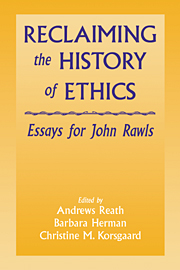Book contents
- Frontmatter
- Contents
- List of Contributors
- Introduction
- Aristotle on the Soul's Conflicts: Toward an Understanding of Virtue Ethics
- Coercion, Ideology, and Education in Hobbes's Leviathan
- The Hobbesian Side of Hume
- The Natural Goodness of Humanity
- Metaphysics, Philosophy: Rousseau on the Problem of Evil
- Within the Limits of Reason
- A Cosmopolitan Kingdom of Ends
- Legislating for a Realm of Ends: The Social Dimension of Autonomy
- Kant on the Objectivity of the Moral Law
- Kantian Virtue: Priggish or Passional?
- Taking the Law into Our Own Hands: Kant on the Right to Revolution
- Kant on Aesthetic and Biological Purposiveness
- Kant on Ends and the Meaning of Life
- Community and Completion
Within the Limits of Reason
Published online by Cambridge University Press: 04 November 2009
- Frontmatter
- Contents
- List of Contributors
- Introduction
- Aristotle on the Soul's Conflicts: Toward an Understanding of Virtue Ethics
- Coercion, Ideology, and Education in Hobbes's Leviathan
- The Hobbesian Side of Hume
- The Natural Goodness of Humanity
- Metaphysics, Philosophy: Rousseau on the Problem of Evil
- Within the Limits of Reason
- A Cosmopolitan Kingdom of Ends
- Legislating for a Realm of Ends: The Social Dimension of Autonomy
- Kant on the Objectivity of the Moral Law
- Kantian Virtue: Priggish or Passional?
- Taking the Law into Our Own Hands: Kant on the Right to Revolution
- Kant on Aesthetic and Biological Purposiveness
- Kant on Ends and the Meaning of Life
- Community and Completion
Summary
The title of Kant's Religion within the Limits of Reason Alone often seems at odds with the work itself. Hardly anything else that he wrote is so full of specificity, colour, and variety. It ranges across comparative religion, Scriptural exegesis, the nature of evil, the destiny of mankind, and church governance; it is full of wry comments on sects and superstitions, on religious follies and excesses. And yet it is never dismissive about the claims of popular religion. How can this exuberant work be thought to lie “within the limits of reason”? The title might seem appropriate to the restrained tone of the passages on the Postulates of Pure Practical Reason towards the end of the Critique of Practical Reason, but not to the baroque structure and texture of the Religion.
On reflection, I believe that a large part of the difficulty in making sense of Kant's choice of title for this work is that we remain surprisingly unclear about his conception of reason. This is surprising because the theme of reason is surely at the centre of Kant's work. Yet many discussions of his work investigate the role of reason in cognition or in morality, or even in the task of connecting the two, but seem to avoid direct questions about what reason is and how its authority may be vindicated, and even relatively guarded questions about what Kant's account of reason is and how he thinks it can be vindicated.
There are good reasons for this caution. We are all familiar with the problem that a vindication of reason – surely the fundamental task of a critique of reason – seems to be in principle impossible.
- Type
- Chapter
- Information
- Reclaiming the History of EthicsEssays for John Rawls, pp. 170 - 186Publisher: Cambridge University PressPrint publication year: 1997
- 1
- Cited by

